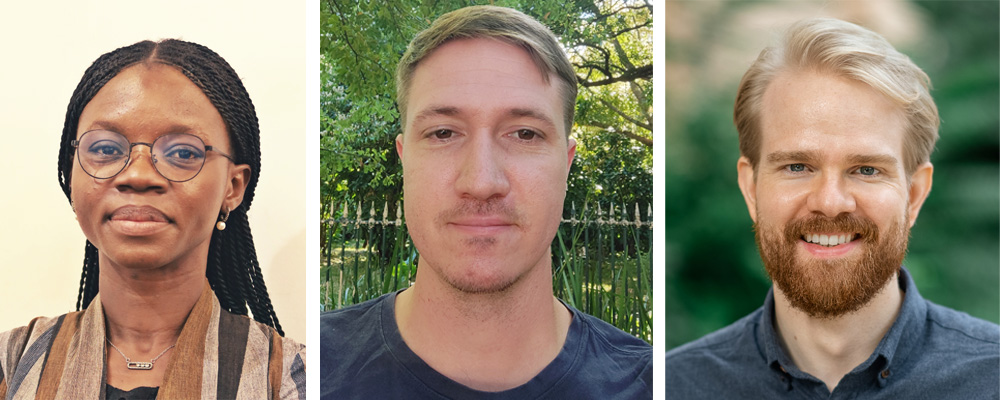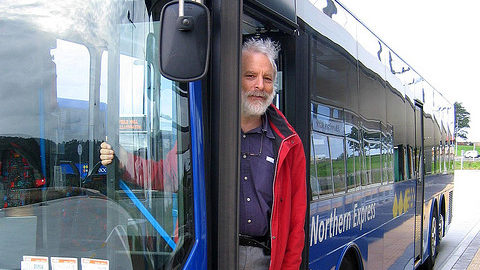Lee Schipper Memorial Scholarship for Sustainable Transport and Energy Efficiency

The “Lee Schipper Memorial Scholarship for Sustainable Transport and Energy Efficiency” targets supporting the momentum of Lee Schipper’s contribution to the enrichment of the international policy dialogue in the fields of sustainable transport and energy efficiency. Lee Schipper, international physicist, researcher, musician and co-founder of EMBARQ (today the Urban Mobility program of the World Resources Institute (WRI) Ross Center for Sustainable Cities) inspired and shaped the thinking of a generation of students and professionals. VREF support the Lee Schipper Memorial Scholarship since 2018.
2024 Lee Schipper Memorial Scholarship awarded for research on multi-modal freight, boda boda motorcycle taxis, national public transit fiscal policies

Olanike Babalola, Tom Courtright and Nicholas Goedking
Three new researchers have been awarded the prestigious Lee Schipper Memorial Scholarship for Sustainable Transport and Energy Efficiency for transformative research proposals that challenge conventional wisdom.
Olanike Babalola, for her research proposal, “Multi-modal Freight Transportation Modelling in Metropolitan Lagos.” Babalola holds a Master of Science in transport and logistics and a Bachelor of Science in economics and education from Lagos State University, Nigeria. This research project will be the basis of her Ph.D. at the University of Lagos. Babalola’s research will simulate different multi-modal freight policy and technology scenarios for the Lagos urban area to estimate the medium and long-term impacts of new freight transport policies and technologies. She will develop new multi-modal freight policy recommendations informed by the model outputs and a comparative review of freight policies in Nigeria and other countries.
Tom Courtright, for his research proposal, “Boda Bodas in Kampala: Accessibility and Mis-Regulation.”Courtright is pursuing a Ph.D. in transportation studies at the University of Cape Town. He also holds a Master of Science in environment and sustainability and a Master of Urban Planning from the University of Michigan, as well as a Bachelor of Arts in international relations from Knox College in Illinois. Courtright is the research director at Africa E-Mobility Alliance and co-founder and research lead for Lubyanza, a boda boda research group. Courtright’s research aims to understand why residents of Kampala choose boda boda motorcycle taxis over other available modes and how under-regulation and for-profit actors have accelerated the growth of the boda boda industry in Uganda.
Nicholas Goedeking, for his research proposal, “Alleviating Political Congestion: Fiscal Support Policies and Public Transit Development.” Goedeking is a senior researcher at the German Institute of Development and Sustainability, having completed a Ph.D. in environmental science, policy and management at the University of California, Berkeley. He also holds a Master of Science in comparative social policy from the University of Oxford and a Bachelor of Arts in philosophy, politics and economics from the University of Durham. Goedeking’s research will examine national fiscal policies for expanding public transit in middle-income countries and the conditions under which these policies are successful. He will develop comparative historical case studies about the public transit investment policies implemented by the national governments of Colombia, Mexico and South Africa.
With the support of WRI and the World Bank, all scholars will present their work at the upcoming Transforming Transportation 2025 conference to recognize and inspire future researchers to shape the future of the transport sector.
On behalf of the Scholarship Board and the Schipper Family, co-founders Holger Dalkmann and Ramon Munoz-Raskin congratulate the new scholars and thank VREF and other partners for their support.
About the scholarship and how to apply
The Scholarship aims to expand contributions to sustainable transport and energy efficiency research and policy dialogue. It prioritizes “iconoclastic” contributions that have clear, transformative outputs and contribute to measurable changes. Proposals relating to different aspects of policy dialogue are welcome, including data collection and quality, diagnosis through data analysis (qualitative and quantitative), policy analysis and evaluation, and interdisciplinary and international comparative analysis.
The scholarship is open to young researchers, and there are no geographic restrictions on scholarship applicants, so young researchers and students of all national origins and fields are eligible to apply. While applications should be submitted in English, research may be completed in other languages to enhance its impact.
Additional African Scholarship
The African Scholarship supports a young researcher from the African continent currently living and working in Africa. In addition to the global selection criteria.
The Scholarship guidelines describe the scholarship application process in detail.
Contact
If you are interested in knowing more about the Scholarship, or if you have ideas that you would like to share with us, please send us an email to cities@wri.org.
See list of all past scholars
Scholarship governance
Lee Schipper inspired and shaped the thinking of a generation
The following was adapted from an obituary written by Kirk R. Smith in Energy Policy
Lee Schipper was an international physicist, researcher and musician, who inspired and shaped the thinking of a generation of students and professionals. Lee was widely recognized for enriching policy dialogue with his passion for data and challenging conventional wisdom. Lee passed away in August 2011 after a brief and difficult battle with pancreatic cancer.

Highly productive career
Most recently, Lee was a senior research scientist at both University of California Berkeley’s Global Metropolitan Studies and at Stanford University’s Precourt Institute of Energy Efficiency conducting research and policy analysis on efficient energy use in transportation systems. He was co-founder of EMBARQ, the World Resources Institute’s Center for Sustainable Transport, and remained as a senior associate emeritus. Over a highly productive career, he worked at the Energy and Resources Group at UC Berkeley, Lawrence Berkeley National Lab, the International Energy Agency in Paris, Shell International in London, as well as being Fulbright Scholar at the Beijer Institute of Ecological Economics in Stockholm. He was a guest researcher at the World Bank, VVS Tekniska Foerening, the OECD Development Center, and the Stockholm Environment Institute.
Sharing the Nobel Peace Prize
Lee authored more than 100 technical papers and a number of books on energy economics and transportation, including Energy Efficiency and Human Activity: Past Trends, Future Prospects (1992) with Stephen Meyers, Richard Howarth, and Ruth Steiner. He served on the editorial boards of five major journals and was a member of the Swedish Board for Transportation and Communications Research. For four years he was a member of the U.S. National Academy of Science’s Transportation Research Board’s Committee on Sustainable Transport and Committee on Developing Countries. He worked in IPCC’s Mitigation group (WGIII), for the third and fourth assessments, thus sharing the Nobel Peace Prize in 2007.
Proponent of sensible policies
In Berkeley in the early 1970s, Professor John Holdren, President Obama’s Science Advisor, was the first person to hire Lee as an energy specialist. He notes that ‘‘Lee was one of the first people to point out that people don’t want to consume energy, but they want to consume energy services, like transportation, comfortable rooms, cold beer and so forth. And that there was an enormous variation in the amount of energy needed to perform those services.’’ Lee’s academic break came in 1976, between the first and second international oil shocks, when he published an influential paper in Science pointing out that Sweden consumed far less energy per unit of economic activity than the United States did. Lee shifted his primary attention to transport in the 1980s, becoming one of the premiere scholars in the field and a tireless proponent of sensible policies for public and private transport.
Master communicator
Lee was a force of nature—an irrepressible fountain of energy, insight, humor, and intelligence. And a master communicator. Part of this was being an irrepressible iconoclast with a wonderful knack of turning a phrase to excellent effect. He could make the basically dry subject of energy efficiency become exciting in ways that engaged students, the media, and policymakers. Evidence for this was publishing 15 letters to the editor in the New York Times on energy efficiency—a nearly legendary achievement. He was also kind, generous, and unselfish with his friends and students and with the grace and self-confidence to be curious and inquisitive about what others were doing.
Vibraphonist
Lee was multi-talented beyond his science. As a UC Berkeley student and vibraphonist, he led his jazz group to victory at the Notre Dame Jazz Festival in 1967. He would reprise the role as band leader with an ad hoc jazz group, Lee Schipper and the Mitigators, who performed primarily in conjunction with energy-related conferences. He was one of the world’s experts on Wilhelm Furtwangler, perhaps the greatest symphonic and operatic conductor of the 20th century, and collected one of the most complete sets of his recordings. Lee seemed to pick up languages effortlessly, speaking fluent Swedish, German, and French, and passable Norwegian, Danish, Spanish, and Portuguese. Even a bit of Russian.